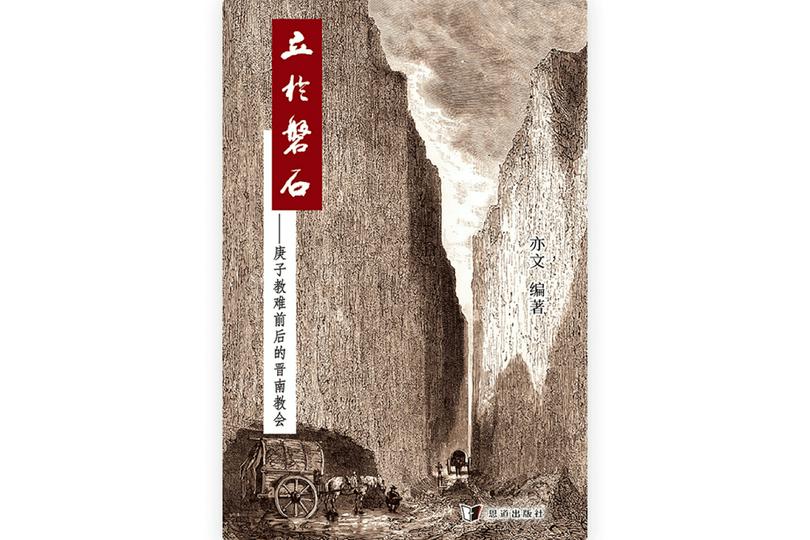Following the lecture titled "The Chinese Church Needs Luke—Reflecting on the Value of Traditional Textual Ministry Through the Publishing Journey of Standing on the Rock," the second session in the series, "How Does the Blood of Martyrs Become the Seed of the Church?—The Reconstruction of the Church in Southern Shanxi After the Boxer Rebellion and Its Implications for the Church Today," was held online on June 28.
The lecture was delivered by Yi Wen, author of Standing on the Rock, which focused on the state of the church in southern Shanxi prior to the Boxer Rebellion and its subsequent reconstruction following the persecution. Pastor Chen was also invited as a guest speaker.
Before sharing her insights, Yi Wen introduced Rufus Anderson (1796–1880), a prominent figure in modern missionary history, and reviewed his missionary principle—that cross-cultural missions should ultimately aim to establish local churches. She noted that in today's context, church planting is no longer the central goal of missionary work. Against this backdrop, reflecting on the establishment and rebuilding of the Shanxi church in the late 19th century offers meaningful insights for the contemporary church.
Situation of Churches in Southern Shanxi Before the Boxer Rebellion
Yi Wen began by defining the geographical scope of the southern Shanxi church, referring to churches located south of Taiyuan, the provincial capital of Shanxi Province.
The first section of Standing on the Rock compiles ministry reports from churches in the region around 1899. By that time, the churches had achieved a notable degree of autonomy, engaging in various forms of evangelistic outreach, including fair evangelism, evangelistic meetings at churches, and anti-smoking gospel centers. Preaching stations and chapels were established in every village and town. As the number of congregations increased, regional associations emerged, organizing spiritual retreats, quarterly meetings, and annual conferences.
The church had begun to influence social customs, bringing changes to traditional forms of recreation and community gatherings to varying degrees. In some villages, entire communities converted after a single person came to faith. Upon embracing Christianity, villagers would voluntarily destroy temple idols.
Church workers regularly convened to discuss matters of church governance, such as eligibility for baptism, admission of seekers, appointment of co-workers, and whether individuals addicted to opium could join the church. They also addressed practical issues such as the conduct of weddings and funerals.
The speaker then referred to a principle of church establishment—membership—and the corresponding system of church discipline.
Yi Wen noted that reports from the China Inland Mission recorded both the number of baptisms conducted in a given year and the total number of baptisms to date. Another key metric was the number of communicants. If an individual committed a clear failing, such as relapsing into opium use, taking a concubine, or reverting to idol worship, the church reserved the right to suspend their participation in Holy Communion. This principle was widely upheld across most mission organizations.
Closely related to church membership was the comity agreement, a cooperative arrangement among different missions. This agreement addressed how churches and believers affiliated with various denominations, such as the Baptist Convention, the Presbyterian Church, and the China Inland Mission, could coexist and interact across China's vast mission fields. The majority of Protestant missionary organizations adhered to what was known as the Protestant Consensus.
Yi Wen cited the Baptist and Presbyterian denominations as examples to illustrate this consensus: "Chinese believers within different denominations are all reborn and saved. There is no sense of superiority or inferiority between them. Believers from other denominations are not considered the target audience for evangelism, unless they are Catholics, in which case, the message of salvation through faith must be preached to them. If a Baptist church has already established a presence in an area, the Presbyterian church should reach out elsewhere. When a single area is too large for one mission to manage, Baptist and Presbyterian missionaries will coordinate, dividing responsibilities. For example, one takes the east side of the city, while the other takes the west."
She added, "If someone transfers from one church to another, they are generally required to present a letter of recommendation from their pastor. If the individual was previously disciplined for misconduct in the Presbyterian Church, they would still be subject to that discipline upon joining the Baptist Church. This demonstrates the mutual recognition of disciplinary actions across denominations."
Yi Wen explained that the inevitability stemmed from the China Inland Mission's missionary strategies and principles, which encouraged indigenous churches to pursue independence in all aspects of their work. The circumstantial aspect arose when Western missionaries from the China Inland Mission joined the ministry in southern Shanxi to collaborate with Pastor Xi Shengmo, a local evangelist who had originally established the gospel work in the region. At that time, Hudson Taylor specifically instructed them not to direct leadership over Chinese church leaders. Rather, they were to submit to Pastor Xi's leadership and follow his direction.
Church Reconstruction After the Boxer Rebellion
When the Boxer Rebellion erupted, missionaries were either killed or forced to flee, and the Chinese church suffered severe losses, both in leadership and congregation. The process of reconstruction involved multiple complex issues, including the burial of the dead, the punishment of perpetrators, compensation negotiations, and the reorganization of the church.
The burial of the dead was not that challenging. After the persecution, the victims were laid to rest in a public and solemn ceremony that honored both traditional Chinese funeral customs and the Christian understanding of life and death. A cemetery was established to allow future generations to pay their respects.
The punishment of those responsible was a sensitive issue. If the penalties were too lenient, they would fail to deter further violence; if too severe, they could provoke public resentment and fuel a cycle of retaliation. Given the widespread nature of the uprising in northern China and the fact that many individuals had been coerced into joining the movement, a consensus was eventually reached: "The principle is to pursue the ringleaders while sparing those who were coerced, in hopes of serving as a warning to others."
Regarding compensation, the China Inland Mission not only declined any form of reparations but also contributed substantial donations toward relief and recovery efforts. Most other Protestant missions also forgave compensation to varying extents. However, Yi Wen pointed out that the China Inland Mission's approach to compensation was nuanced and context-dependent and cannot be fully captured in a simple summary.
After the Boxer Rebellion, returning missionaries paid door-to-door visits to local church members and leaders. Before offering any guidance, they spent significant time listening, drawing on their understanding of rural church life during the late Qing Dynasty to analyze the complex circumstances and gradually formulate appropriate responses. Yi Wen noted that this was the exclusive "news" of Standing on the Rock.
Rebuilding the church was a nuanced and context-sensitive process. For example, handling backsliders was a sensitive matter. Yi Wen posed a dilemma: "If all were expelled, the church may be empty; if all were accepted, the church may appear to be rebuilt, but it may also lack witness." She emphasized that the concept of "backsliding" is not always clear-cut and often requires discernment within the broader social and historical context.
The return of the missionaries left profound shocks for the non-believers, including former Boxers. After observing that the missionaries had resumed preaching and continued doing good deeds, many were reassured. Their return also opened the door for some Chinese believers to repent and return to the church.
During the persecution, missionaries endured the brunt of the pain, while Chinese church leaders also became targets of public criticism. New workers replaced some missionaries. Hudson Taylor, founder of the China Inland Mission, withdrew from the spotlight and was succeeded by Dixon Edward Hoste. The leadership within the Chinese church also transitioned. The missionaries objectively documented how several church leaders, under pressure, had at times renounced their faith, either verbally or through their actions, and how they were later accepted and restored.
Yi Wen raised a question: "If the missionaries' original vision had been limited to leading people to the Lord rather than church planting, what would have happened during the Boxer Rebellion?"
On one hand, there might have been no churches to destroy or loot, since none would have been established. Without church life, discipleship, or leadership, believers could have remained anonymous, sparing them from persecution. On the other hand, congregants scattered like loose sand without the collective worship and building of a community, therefore having no impact on local customs or society. Evangelism would become an endless cycle of starting over. In such a scenario, the church would not exist, let alone be rebuilt.
Finally, Pastor Chen offered two reflections in response to the lecture.
First, regarding the church membership, he noted that while Chinese churches have long had a membership system, such a historic practice does not mean it should be imitated. Rather, the church should be built on the Bible. Although the Bible does not contain a membership list, it does mention specific lists, such as the list of widows cared for by the church. For example, the apostle Paul instructed the church in Corinth to expel a brother guilty of adultery. Pastor Chen remarked, "If a person was never formally part of the church, there is no basis for formally expelling him." He emphasized that if the membership system is truly valued, "then the rebirth and salvation of members will also be valued, along with their commitment to Christ and the body of Christ."
Second, about the understanding of suffering and persecution, Pastor Chen shared four insights on the significance of believers' suffering and martyrdom for the church. First, while Christians may lose their earthly lives, they gain eternal life. Second, their suffering serves as a powerful testimony for the gospel. Third, they participate in the power of Christ's resurrection. Finally, those who survive persecution, like a light in the world or a city set on a hill that cannot be hidden, also form a part of the witness in martyrdom.
Originally published by the Christian Times
- Edited by Katherine Guo and translated by Poppy Chan












